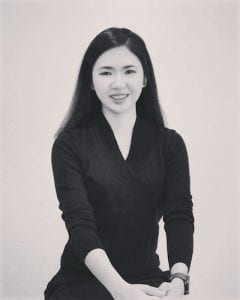Dahyeon Jung has been an MA student in the Child and Adolescent Development (ChAD) program at SJSU since Fall 2018. Having also earned her bachelor’s degree from SJSU in 2017, Jung recalls numerous highlights of her time as a ChAD student.
“I [have] met amazing cohorts,” Jung says. “We’ve been through pain and gain altogether. My cohorts always encouraged me to keep ahead whenever I struggled. Once I was homesick for Korea, my cohorts became my sweet home here. They always checked in if I needed anything.”
Jung describes her professors in the Child and Adolescent Development department as kind and knowledgeable. “ChAD professors in the graduate program always encourage students to take different perspectives and teach students how to elaborate [on] their views and insights. I’ve learned so much from not only professors, but also classmates, because professors encourage students to express their thoughts during our coursework.”
Jung’s thesis advisor, ChAD Assistant Professor Dr. Kim Tsai, has only positive comments about her.
“One of my favorite aspects of being a ChAD faculty member is mentoring students on their research projects,” says Dr. Tsai. “This year, I worked with Dahyeon Jung on her Master’s thesis to examine how parenting practices affect adolescents’ social media use. As a mentor, I want my students to be able to reflect back on their work and feel proud and accomplished in knowing that they gave their best efforts. Thus, it was truly rewarding to observe Dahyeon’s drive and persistence as she embraced new challenges as opportunities to learn and hone in on her research skills.”
Jung says Dr. Tsai’s guidance allowed her to develop her research paper and finish it without losing confidence. “I believe our professors at SJSU support as much as possible students who want to explore the research field,” says Jung, “just like Dr. Tsai has always been willing to give me valuable advice and guidance.”
Notably, Jung says that one of the most important skills she gained from her graduate program is the ability to interpret and convert research into an audience-appropriate format. “Reading is a big part of my graduate program. I gained knowledge from reading, but I wasn’t ready to share what I’ve learned from articles with others (especially for parents who need that information.) [The] ChAD MA program taught me how to share the information from academic sources with people who don’t have an academic background in the Child and Adolescent development field. This was very helpful when I worked as a director in Agape Christian Preschool. I could interact with parents and teachers with what research says.”
These heightened research communication skills led Jung to actualize her professional interests and become closer to her goals. “I want to work in the research field,” Jung says, “and the graduate program provided me with the first step for my research journey.”
Jung appreciates the opportunities that SJSU and the College of Education afford to graduate students such as the Lurie College Student Research award, which Jung received herself. “I am not an exceptional student, and I had never done research before my thesis,” says Jung. “I like that SJSU provides opportunities to students who have passion, and supports students to achieve their goal.”
Outside of graduate study, Jung loves escape room games. “Finding clues and solving puzzles with friends is fascinating! I am so sad that I could not do them anymore due to COVID19. I hope I can play the escape room soon with my friends,” she says.
Learn More About Dahyeon’s MA Thesis:
“It is hard to think of the world without media,” Jung says. “Adolescents are one of the biggest consumers of media; therefore, it’s not surprising that parents are concerned about how media may affect their child’s development. This upward trend in media use sparked my curiosity about how parents can help their adolescents become critical media consumers. With the encouragement and support from professors in the Department of Child and Adolescent Development, I conducted a research study to investigate how parenting practices influence adolescents’ risky media usage. I surveyed 315 adolescents in the U.S. My findings indicated that adolescents with parents who are too strict or withdrawn are more likely to engage in risky online behavior and develop internet addiction. However, adolescents with high self-esteem were less likely to engage in risky media usage regardless of their parents’ practices. These findings highlight that high-quality parent-child relationships, such as parental warmth and support, and high self-esteem, protect adolescents from risky media usage.”

